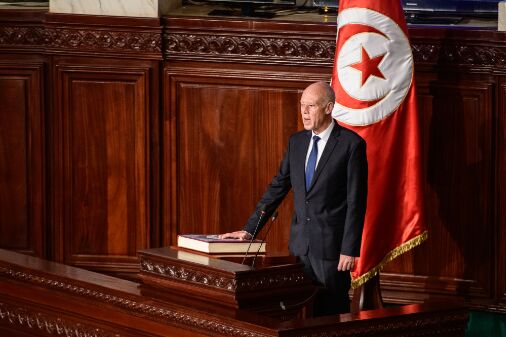Regression to authoritarianism?
Tunisia's nascent tryst with democracy, which shines exemplarily in the North African region, is at risk of faltering as the President usurps executive power

Tunisia, the only country in the Arab world where full democracy emerged following the 2011 Arab spring, is in the grip of a constitutional crisis due to a power struggle between the President and the Prime Minister.
The crisis began on July 25 after President Kais Saied, invoking Article 80 of the Constitution, dismissed Prime Minister Hichem Mechichi government, froze Parliament for 30 days, lifted the immunity of Parliament members and made himself prosecutor general, leading to confrontations between his supporters and opponents.
He also assumed executive power over the judiciary and deployed the army to enforce his rule. The development has implications not only for Tunisia but also on the prospects for democracy across North Africa.
Tunisia is one success story that came out of the Arab spring. Among the countries that toppled dictators a decade ago, only Tunisia emerged as a full democracy. Its free and fair elections featuring Islamists and secularists, free-marketeers and communists, stand out in the region dominated by authoritarians.
Saied's action is the culmination of months of institutional stalemate and political infighting. He was having a showdown with the Prime Minister and Parliament Speaker Rached Ghannouchi over the powers of the legislature and the respective roles of the dual executive — the President and the Prime Minister.
For nearly two years after his landslide victory in the presidential contest in 2019, Saied, a political independent known for his political contempt of party politics, has been bitter about the country's political system and its constitutional provisions that limit the President's power in matters relating to military and foreign policy only.
He has locked horns with two Prime Ministers — Elyes Fakhfakh and Mechichi, whom he himself selected after a deeply divided Parliament failed to have a consensus candidate. Under the dual executive system, the Prime Minister is the head of the government directing the cabinet. The Prime Minister's authority strengthened following the country's move to democracy.
Some of the contentious issues between Saied and Mechichi included who had the power to appoint ministers and oversee the security services. Their differences escalated when Mechichi, who had a slim parliamentary majority comprising three parties – Ennahda, Karama Coalition and Qalb Tounes — reshuffled his cabinet approved by Parliament but Saied denounced the action as unconstitutional.
The deadlock continued and the government remained in limbo at a time when there was anger among Tunisians over the handling of the Covid-19 situation and deteriorating state of the economy that has contracted nearly 10 per cent due to a sharp drop in tourism since the pandemic broke out.
The recent devastating wave of the pandemic and deaths led to protests by the people already fed up with the squabbling politicians and virtually non-functional institutions. This gave a handle to the President to dislodge Mechichi and project himself as a saviour from institutional paralysis, political corruption and economic stagnation.
His action to sack a democratically elected government is an alarming development that puts the only democracy in the Arab world at risk of unravelling. The crisis has also put the military in a bind. Since the beginning of the Tunisian revolution, the military resisted being drawn into domestic political conflicts. With Saied assuming the executive power, the military had to obey political orders.
Military and security officials were present with him when he announced the seizure of power. Observers see this as a symbol of the military being drawn, willingly or unwillingly, in political disputes. Supporters of the President and of Ennahda had a violent confrontation on streets across the country, raising the fear that security forces could be drawn in the crisis that the observers say, heralds an era of instability and may prompt the military to grab power.
His action has to be watched in the coming days. Whether he appoints a new Prime Minister and hands over the functioning of the government or consolidates control over the levers of power and security apparatus.
Several influential civil society organisations in the country have sought a roadmap with a detailed timetable for the restoration of the democratic process. Influential Tunisian NGS have warned against any illegitimate extension of the suspension of the Parliament, emphasising the need to respect the 30-day deadline mentioned in Article 80 of the Constitution.
Democracies worldwide should step in resolving the crisis by urging and pressuring Saied to return Tunisia to its democratic path. Many observers are of the view that Saied may use the crisis to push for what he has called his preferred constitutional settlement — a presidential system based on elections but with a smaller role for the Parliament.
They also fear that the development could be the beginning of an authoritarian process marked by a return to personalised power that was wielded by President Zine El Abidine Ben Ali who was ousted during the public uprising in 2011. The failure of democracy in the country would also vindicate violent extremists who have attacked Ennahda and other political Islamists for naively putting too much faith in ballots instead of bullets.
A lot is at stake if Tunisia's nascent democratic experiment falters. It would demoralise democracy activists and their proponents as well as movements in the Arab world. This may embolden regional autocrats and those opposed to the democratic process terming it as being inherently flawed.
The writer is a former Editor of PTI and served as the West Asia correspondent for the same. Views expressed are personal



